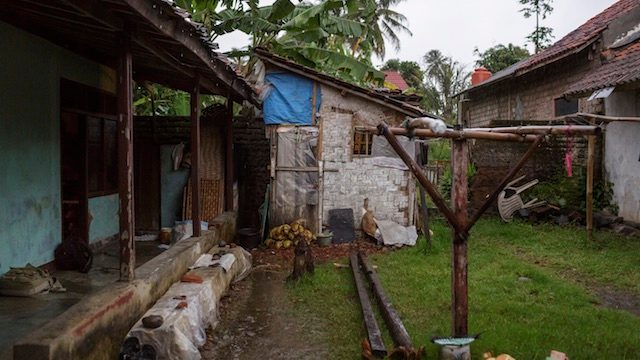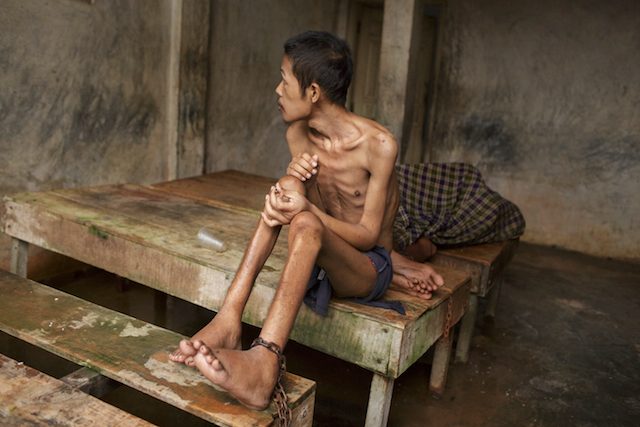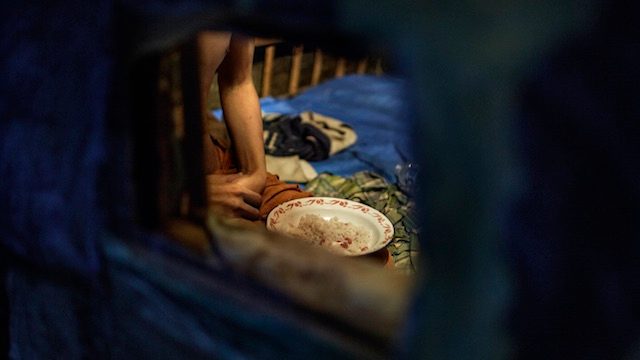SUMMARY
This is AI generated summarization, which may have errors. For context, always refer to the full article.

This compilation was migrated from our archives
Visit the archived version to read the full article.
JAKARTA, Indonesia – “One male staff member touched my vagina this morning. He was doing it just for fun,” Tasya, a 25-year-old woman with a psychosocial disability, said in a healing center in Brebes.
Tasya is just one of 57,000 people with real or perceived psychosocial disabilities in Indonesia who have been shackled, locked up or maltreated at least once in their lifetime.
On Monday, March 21, Human Rights Watch released a report on abuses against people with psychosocial disabilities in Indonesia – a study conducted between November 2014 and January 2016. The organization visited 18 mental hospitals and institutions across Java and Sumatra and documented 175 cases across 5 provinces of people who are now shackled, locked up, or were released lately.
“I met a woman whose family kept her locked in a room for 15 years,” Kriti Sharma, disability rights researcher at Human Rights Watch and author of the report said.“Shackling people with mental health conditions is illegal in Indonesia, yet it remains a widespread and brutal practice.”

HELL. A 24-year-old female resident lies with her wrist and ankle chained to a platform bed at Bina Lestari healing center in Brebes, Central Java. After her husband abandoned her and her 5 year-old daughter to marry someone else, she began to experience depression. Photo by Human Rights Watch
Despite a ban on shackling — known as pasung — since 1977, the practice remains rife; government data shows over 18,000 are still shackled in homes often in goat or chicken sheds or institutions.
Ankles of some people with a psychosocial disability are bound with chains or wooden stocks from a couple of hours to days to months or even years, often outside, with the person frequently naked and unable to wash.
– 29-year-old man with a mental health condition said in Yayasan Galuh Rehabilitation Center in Bekasi
Poor conditions
Under Indonesian law, it is relatively easy to forcibly admit a person with a psychosocial disability to an institution.
Human Rights Watch found 65 cases of arbitrary detention in institutions – none of those interviewed who were in institutions were there voluntarily. The longest cases the report documented was 7 years at a social care institution and 30 years at a mental hospital.
The report also found that conditions of confinement are overcrowded and in poor sanitation. Most people in these institutions sleep without mattresses and stay in tiny, stiflingly hot rooms, with little ventilation.
In Panti Laras 2, approximately 90 women live in a room that can reasonably accommodate 30 people. To walk in and move around, one must tiptoe over hands and feet. Many people in Panti Laras 2 and Galuh were found to have lice.
– Bulan, who is in her mid-twenties with a psychosocial disability told Human Rights Watch
People in Panti Laras 2 are also obliged to use a drain or an open toilet located within the room to urinate and defecate. Even in institutions with suitable toilets, residents are not always allowed to use them.

POOR CONDITIONS. In 2012 there was no proper housing at Galuh Rehabilitation Center. The men and women at Galuh lived separated by a wire wall. Since then the pavilion has been replaced by a privately funded building but the abuses, including chaining, continue. Photo by Human Rights Watch
“Even when someone gets diarrhea they don’t let them go to the toilet; they do it in the drain [in the dormitory].They used to give us medicine for scabies but they’ve run out of it,” Sinta said. She stays in Galuh Rehabilitation Center in Bekasi.
‘Living in hell’
There are only 600 to 800 psychiatrists—or one trained psychiatrist per 300,000 to 400,000 people in all of Indonesia. Ministry of Health data shows that nearly 90 percent of those who may want to access mental health services cannot.

Because of this, involuntary treatment is applied to some, due to a lack of psychiatrists and mental healthcare.
Many Indonesians in rural areas believe that mental illness is caused by possession of evil spirits or the devil. Thus, families typically consult faith or traditional healers first, and often only seek medical advice as a last resort.
Persons with psychosocial disabilities in 13 institutions in Indonesia, including children, were routinely forced to take medication or subjected to alternative “treatments” such as concoctions of “magical” herbs, vigorous massages by traditional healers, Quranic recitation in the person’s ear, and baths. They are also forced to have electroshock therapy, secluded, restrained and forced contraception.
Punishment for not following orders also included fighting or sexual activity.
In one of many healing centers, men and women were chained next to each other, leaving women no option to run away if abused. In 3 institutions, Human Rights Watch found evidence of staff giving women contraception without their consent or knowledge.

“They call my name, put medicine in my hand and ask me to drink it…. They don’t allow me to refuse,” Wuri, a woman living in a rehabilitation center, said. “Imagine living in hell, it’s like that here,” another woman said.
One father of a woman with a mental health problem said he locked her in a room after consulting faith healers because she was destroying the neighbor’s crops. When she tried to dig her way out of the room, her parents tied her hands behind her back.
She stayed naked in the rubble, eating, sleeping, urinating, and defecating in the room for 15 years before they released her.
Efforts
Indonesia government has done some work to free the mentally ill from their shackles and from harmful practices.
The Health and Social Affairs ministries each have started an anti-shackling campaign and a new mental health law requires integrating mental health care with primary health care. Teams of government officials, medical personnel, and staff in government institutions are tasked with freeing people from shackling.
However, “partly because Indonesia’s government is so decentralized, implementation at the local level has been very slow” Human Rights Watch noted.
Last year, the Indonesia health budget was just 1.5% of the total budget and 90% of those who want access to mental health services could not due to a paucity of services.
The government aims to have universal health coverage, including mental health care, by 2019. By March 2015, over 130 million Indonesians were enrolled in the program.
But Human Rights Watch think this is not enough. It is urging the Indonesian government to immediately order inspections and regularly monitor all institutions. It also wants the government to take action against facilities that practice shackling, or abuse people with psychosocial disabilities.
– Human Rights Watch report
The organization also called for the amendment of the 2014 Mental Health Act “to ensure that people with psychosocial disabilities have the same rights as other Indonesians.” It also urged that the government pass the Rights of Persons with Disabilities Bill, in line with the United Nations Convention on the Rights of Persons with Disabilities, which Indonesia ratified in 2011.
“The government should develop voluntary and accessible community-based support and mental health services in consultation with
Add a comment
How does this make you feel?
There are no comments yet. Add your comment to start the conversation.